Planning worship?
Check out our sister site, ZeteoSearch.org,
for 20+ additional resources related to your search.
- |
User Links
Person Results
‹ Return to hymnal
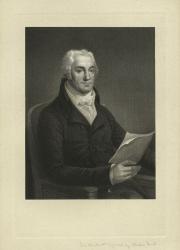
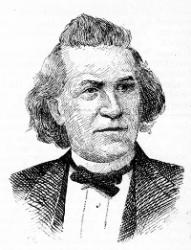
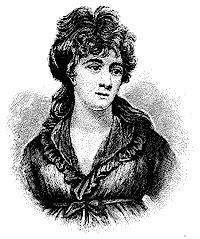
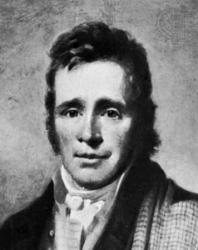
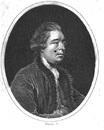
Export as CSV
Joel Barlow

1754 - 1812 Hymnal Number: d3 Author of "Along the banks where Babel's current flows" in Songs for the School Room Barlow, Joel, born at Reading, Connecticut, 1755 [sic], graduated at Yale 1778, and died near Cracow, Poland, 1812, He was well known as an author and politician during and after the American Revolution. His publications include Hasty Pudding; Columbia, &c. In 1785, at the request of the (Congregational) General Association of Connecticut, he corrected and enlarged Dr. Watts's Psalms, supplying those omitted by Watts, and adapting the whole to American thought and circumstances. This work, published in 1786, went through various editions, and, although officially superseded by Dwight in 1800, it continued to be issued for many years after. Its title is somewhat curious as setting forth its design. It reads:— Psalms carefully suited to the Christian Worship in the United States of America, being Dr. Watts’ Imitation of the Psalms of David, as improved by Mr. Barlow. Of his renderings of the Psalms, there are still in common use:—
1. Awake, my soul, to sound His praise. Ps. cviii. This is No. 233 in Hatfield's Church Hymn Book, 1872, and other collections.
2. Lord,Thou hast scourged our guilty land. Ps. lx. Altered from Watts. Also in Hatfield's Church Hymn Book, No. 1312.
3. Our land, O Lord, with songs of praise. Ps. xxxi . In the Philadelphia Presbyterian Hymnal, 1874.
4. In Thee, great God, with songs of praise. National Hymn. This is No. 3 in a slightly different form. It is No. 962 in N. Adams's Church Pastorals, Boston, 1804. [Rev. F. M. Bird, M.A.]
-- John Julian, Dictionary of Hymnology (1907)
Joel Barlow
William Knox
1789 - 1825 Hymnal Number: d139 Author of "Time speeds away, away, away" in Songs for the School Room Born: August 17, 1789, Firth, Lilliesleaf, Roxburgh, Scotland.
Died: November 12, 1825, Edinburgh, Scotland.
Buried: New Calton Burial Ground, Edinburgh, Scotland.
Knox, William, born at Firth, Lilliesleaf, Roxburgh, Aug. 17, 1789, and educated at the parish school, and the grammar school at Musselburgh. For some time he was engaged in farming at Wrae, near Langholm, Dumfriesshire; but not succeeding to his satisfaction, he left Wrae in 1817, and finally settled in Edinburgh in 1820, where he subsequently obtained employment as a contributor to the public journals. He died in Edinburgh, Nov. 12, 1825. His poetical works were, (1) The Lonely Hearth, North Shields, 1818 ; (2) Songs of Israel, 1824; (3) The Harp of Zion, 1825; and (4) these three works, together with a short Memoir, as his Poems, &c, Lond., J. Johnson, 1847. The Songs and Harp are mainly paraphrases of portions of Holy Scripture. A few have come into use as congregational hymns, as, "A voice comes from Ramah," "Acquaint thee, O mortal," "O sweet as vernal dews that fall" (Ps. cxxxiii.), and others.
--John Julian, Dictionary of Hymnology (1907)
William Knox
Thomas Darling
1816 - 1893 Hymnal Number: d93 Author of "Shepherd of thy little flock" in Songs for the School Room Darling, Thomas, M.A., son of George Darling, M.D., born in London, 1816, educated at the Charterhouse, and St. John's College, Cambridge, graduating B.A. 1838, and M.A. 1841. In 1839 he took Holy Orders, and subsequently became Incumbent of Thanington, near Canterbury, and in 1848 Rector of Sts. Michael Royal with St. Martin-Vintry, City of London. Mr. Darling published in 1855 Hymns for the Church of England (Lond. Longmans), arranged according to the Order of the Book of Common Prayer. The last edition (1887) contains 336 hymns, of which about 20 are by the editor.
These hymns, which appeared from time to time in the various editions of his collection, are:—
1. All saints of the Lord. (1855.) Easter. In the 1887 ed. of the Hymns, this reads, "Ye saints of the Lord."
2. As chief among ten thousand see. (1858.) Easter.
3. At early dawn the mountain bound. (1857). For Private use.
4. Behold, I come; and with me bring. (1860.) Sunday next before Advent.
5. Behold, the vineyard of the Lord. (1857.) The Church of Christ.
6. Father of heaven, all nature upholding. (1858.) Trinity.
7. From cleft in Pyrenean rock. (1858.) Healing Water. For Private use.
8. Lift high a festal canticle. (1857.) Christmas.
9. Most gracious Lord, in all distress. (1855.) Common Trouble.
10. The everlasting hills declare. (1858.) Ascension. Written at Bagneres de Luchon in the Pyrenees, 1858.
11. There are who mount with eagle wings. (1858.) St. John the Evangelist.
12. There is a stream whose waters flow. (1858.) Living Water.
13. To God the glory, while we tell. (1860.) Sts. Michael and All Angels.
14. We now with one accord. (1855.) In the 1887 edition of the Hymns, &c, this is given as, "Let all men praise the Lord."
15. What light is this whose silvery gleam. (1855.) Epiphany.
16. Who, when beneath affliction's rod. (1855.) Resignation.
In addition to these Mr. Darling has most successfully adapted hymns from other writers. These include, "Lord Jesus, taken from Thy servants' sight"; "Shepherd of the ransomed flock"; "The winds of God have changed their note" (all of which see); and "By faith, from day to day," and "Where dwells the glorious King?" from "The God of Abraham praise" (q.v.). Mr. Darling's original compositions and adaptations are more richly poetical than is usual with modern hymns. They are at the same time very devotional and of practical value.
-- John Julian, Dictionary of Hymnology (1907)
===================
Darling, Thomas, p. 230, i. In 1857, Mr. Darling published a small tract as Hymns from the Mountain. Written during a month's Tour in the South of France, in the Summer of the Year MDCCCLVII, Loud., Spottiswoode & Co. The hymns therein are Nos. 3, 5, 7, 10, 12, as on p. 280, i., and "On mountain side, in sheltered dell." (For Private Use.) All these hymns must be dated "1857." He died Aug. 21, 1893.
--John Julian, Dictionary of Hymnology, Appendix, Part II (1907)
Thomas Darling
Elias Nason

1811 - 1887 Hymnal Number: d141 Author of "To thee, O God, in grateful praise" in Songs for the School Room Nason, Elias, a Congregational minister, lecturer, and writer, was born at Wrentham, Massachusetts, April 21, 1811, and was educated at Brown University, where he graduated in 1835. He was a teacher in Georgia for some time, and from 1840 to 1849 in Newburyport, Massachusetts. Subsequently he entered the Congregational ministry. He is the author of several biographies. In 1855 he published Songs for the School Room; in 1857 his Congregational Hymn Book; and in 1863, in conjunction with Dr. Edward Kirk, Songs for Social and Public Worship. His hymn, "Jesus only, when the morning " (Jesus always), was written at Natick, Massachusetts, about 1856, and was published with music by the author in the Boston Wellspring. [Rev. F. M. Bird, M.A.]
--John Julian, Dictionary of Hymnology (1907)
====================
http://en.wikipedia.org/wiki/Elias_Nason
Elias Nason
J. W. Cunningham
1780 - 1861 Hymnal Number: d47 Author of "How cheering the thought, that the spirits in bliiss" in Songs for the School Room Cunningham, John William, M.A., was born in London, Jan. 3, 1780, and educated at St. John's College, Cambridge, where he graduated in honours, and subsequently became a Fellow of his College. In 1802 he was ordained to the Curacy of Ripley, in Surrey. The following year he removed to Ockham, and later to Clapham, where he was curate to the Rev. John Venn, who was the original of Berkeley in The Velvet Cushion. In 1811 he was presented by his family to the Vicarage of Harrow, which he held for fifty years. He died Sept. 30, 1861. He published, in addition to pamphlets on various subjects:—
(1) World without Souls, 1805; (2) The Velvet Cushion, 4th ed. 1814; (3) De Ranee, a Poem, 1815; (4) Morning Thoughts on the Gospel of St. Matthew, 1824; (5) Morning Thoughts on the Gospel of St. Mark, 1827. The two series of Morning Thoughts contained hymns which were given without any signature. As there is an acknowledgment that with the verse, in the first case he was assisted by "a friend," and in the second “by friends," it is impossible to distinguish his work from that of his "friends."
With his name and publications the following hymns are associated:—
1. As the sweet flower that scents the morn. Death of an Infant. This poem appeared in The Velvet Cushion (4th ed. 1814, p. 157), in 6 stanzas of 4 lines. ln1826 it was given in a revised form as a hymn in 3 stanzas of 4 lines in the American Episcopal Psalms & Hymns, No. 127. In the Unitarian Hymns for the Church of Christ (Hedge & Huntington), 1853, No. 762, it is increased to 4 stanzas. It has been attributed to Allan Cunningham, but in error.
2. Dear is the hallowed morn to me. Sunday Morn¬ing. This was given in Oliphant & Sons' Sacred Poetry, 4th ed., 1822, in 8 stanzas of 4 lines, and signed "Cuningham." In 1833 Bickersteth gave stanza i.—iii., vi., as No. 639 in his Christian Psalmody, beginning, "Dear is to me the Sabbath morn." This has been repeated in English and American collections.
3. From Calvary a cry was heard. Good Friday. Published in his Morning Thoughts on St. Matthew, 1824, p. 103, in 5 stanzas of 4 lines. It is in somewhat extensive use In America, and sometimes in 4 stanzas as in Dr. Hatfield's Church Hymn Book, 1872, No. 460.
4. How cheering the thought that the spirits in bliss. Ministering Angels. Published in his Morning Thoughts on St. Matthew, 1824, p. 15, in 2 stanzas of 4 lines. In Bateman's Sacred Melodies, the Scottish Presbyterian Hymnal for the Young, 1882, &c, and several American collections, it is given as "How [dear is] delightful the thought that the angels in bliss."
5. The God of Israel never sleeps. Watchfulness. Published in his Morning Thoughts on St. Mark, 1827, p. 103, in 3 stanzas of 6 lines. As No. 548 in Kennedy it is in an altered form. [William T. Brooke]
--John Julian, Dictionary of Hymnology (1907)
J. W. Cunningham
Thomas Gray
1803 - 1849 Hymnal Number: d103 Author of "Suppliant, lo, thy children bend" in Songs for the School Room Born: February 14, 1803, Jamaica Plain, Roxbury, Massachusetts.
Died: March 6, 1849, Boston, Massachusetts.
Gray, Thomas, jun., M.D., was b. at Jamaica Plain Roxbury, Massachusetts, Feb. 4, 1803, and educated at Harvard College, where he graduated in 1823. After visiting England and the Continent ho took his M.D. in 1827, and commenced the practice of medicine in Boston, U.S.A. He subsequently exchanged the practice of medicine for that of chemistry. He died in Boston, March 6, 1849. His hymns were mainly written for children, and for occasional services. They are of more than ordinary merit, and are much used by the Unitarians, of which body Dr. Gray was a member. They include:—
1. Good-night, good-night, our song is said. Evening. Popular with children.
2. Jehovah! at Thine awful throne. Ordination.
“Written for the Ordination of Mr. George Whitney as Pastor of the Second Church and Society in Roxbury, June 15,1831."
3. Our Father, here again we raise. Morning. In Gray's Sunday School Collection, 1833.
4. Suppliant, lo! Thy children bend. Prayer. Also in Gray's Sunday School Collection, 1833.
5. We come in childhood's innocence. Opening of a Sunday School. Given in Gray's Sunday School Collection, 1844.
6. While round Thy throne, 0 God, we bend. Anniversary of Sunday School “Written for the Jubilee of the Boston Sunday School Society, at the Federal Street Church, Sept. 14, 1831." It was given in Gray's Collection, 1833.
For these details we are indebted to Putnam's Singers and Songs of the Liberal Faith, 1874, pp. 171-176.
-- John Julian, Dictionary of Hymnology
Thomas Gray
Daniel C. Colesworthy
1810 - 1893 Hymnal Number: d1 Author of "A little word in kindness spoken" in Songs for the School Room Colesworthy, Daniel C., a printer, editor, and bookseller, was born at Portland, Maine, in 1810, and is now (1885) resident in Boston. He has published several volumes of verse, including Sabbath School Hymns, 1833; Opening Buds, 1838; The Year, 1873; and School is Out, 1876. Of his hymns the following are the best known:—
1. A little word in kindness spoken. Kindness. This appeared in his paper, The Portland Tribune, Sept. 25, 1841.
2. While we lowly bow before Thee. Close of Service. Included in E. Nason's Congregational Hymn Book, 1857, and thence has passed into several collections of later date, including Songs for the Sanctuary, N.Y., 1865-72; Laudes Domini, N. Y., 1884, and others.
Mr. Colesworthy is a member of the Congregational body. [Rev. F. M. Bird, M.A.]
--John Julian, Dictionary of Hymnology (1907)
Daniel C. Colesworthy
Amelia Opie

1769 - 1853 Hymnal Number: d133 Author of "Shall I be mute" in Songs for the School Room Opie, Amelia, née Alderson, daughter of Dr. Alderson, a physician at Norwich, was born there Nov. 12, 1769. In May 1798 she was married to John Opie, the painter, who died in 1807. Originally Mrs. Opie was an Unitarian, but in 1814 she joined the Society of Friends. Most of her subsequent life she lived at Castle Meadow, Norwich, where she died Dec. 2, 1853. Mrs. Opie's prose works were somewhat numerous, and included Father and Daughter, 1801, a most popular tale; Temper, 1812; Tales of Real Life, 1813; and others. Her poetical works were Miscellaneous Poems, 1802; The Warrior's Return and Other Poems, 1808; Lays for the Dead, 1833, &c. Very few of her poems have come into use as hymns. The best known is “There seems a voice in every gale."
--John Julian, Dictionary of Hymnology (1907)
===================
Opie, Amelia , p. 871, i. Another hymn by Mrs. Opie in common use is "When the disciples saw their Lord" (Travel by Sea and Land), in Com. Praise 1879. Dated 1838.
--John Julian, Dictionary of Hymnology, Appendix, Part II (1907)
Amelia Opie
James Hogg

1772 - 1835 Hymnal Number: d59 Author of "Lauded be thy name forever" in Songs for the School Room Hogg, James, second son of Robert Hogg, was born in Ettrick Forest, Selkirkshire, January 25, 1772, according to his own account, though the baptismal date is December 9, 1770. He is perhaps best known as the Ettrick Shepherd, and friend of Professor John Wilson and Sir Walter Scott. He died November 21, 1835, on his farm of Altrive in Yarrow. An edition of his Poetical Works was published in 1822 in 4 vols. (Edin., A. Constable) including the best of his poems—- The Queen's Wake, 1813; The Pilgrims of the Sun, 1815; Mador of the Moor, 1816, &c. The two hymns by him which have come into use are, "Blessed be Thy name for ever," and "O Thou that dwellest in the heavens high." A complete edition of his prose and verse was pub. in 2 vols., 1865 (Glas., W. G. Blackie).
1. Lauded be Thy Name for ever. Morning. This is "The Palmer's Morning Hymn" (in 32 lines), which forms a part of Canto iv. of his poem Mador of the Moor, 1816. It is sometimes given in this form, but more frequently as "Blessed be Thy Name for ever" (2 stanzas of 8 lines), as in the Society for Promoting Christian Knowledge Hymns, 1852, and others. It is also altered as "Lord of life, the Guard and Giver," as in Mercer, &c.
2. 0 Thou that dwellest in the heavens high. Midnight. This was given,together with music, as "A Cameronian's Midnight Hymn," in 8 stanzas of 4 lines, in his tale of The Brownie of Bodsbeck, 1818. Although found in several collections its use is not so great as that of No. 1. [Rev. James Mearns, M.A.]
-- John Julian, Dictionary of Hymnology
James Hogg
John Hawkesworth

1715 - 1773 Person Name: J. Hawkesworth Hymnal Number: d57 Author of "In sleep's serene oblivion laid" in Songs for the School Room Hawkesworth, John, LL.D. (b. 1715, and d. Nov. 1773), a writer in the Gentleman's Magazine, proprietor and editor of the Adventurer, and friend of Johnson, Warton, and other literary men of note, published, in 1760, Poems and Translations, and was the author of the well-known Morning hymn "In sleep's serene oblivion laid." This hymn was composed in 1773, "about a month before his death, in a wakeful hour of the night, and dictated to his wife on rising. It appeared in the Universal Theological Magazine for March, 1802." (Miller's Singers & Songs, &c, p. 210.) It was given in Collyer's Selection, 1812; the Leeds Hymn Book, 1853; and others; and is in somewhat extensive use in America. It sometimes begins, as in the American Unitarian Hymns for the Church of Christ, 1853, with stanza ii., "Newborn, I bless the waking hour."
-- John Julian, Dictionary of Hymnology
John Hawkesworth


 My Starred Hymns
My Starred Hymns


